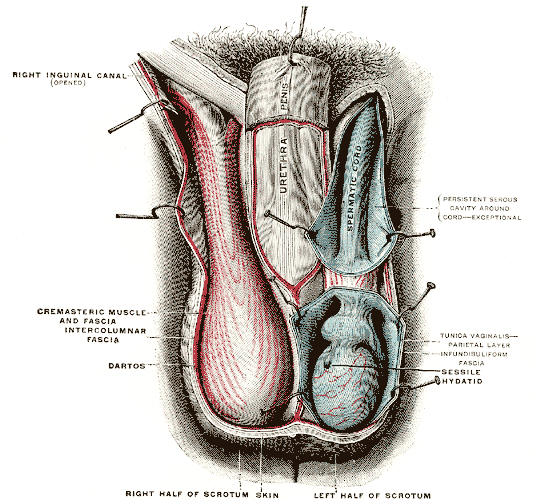
Sex Drive and Stress
Stress = Fear = Balls In
Although the focus of the response is different (real vs. imagined danger), fear and anxiety are interrelated. When faced with anxiety, most people will experience the physical reactions of fear. Muscle tension, increased heart rate, and shortness of breath mark the most significant physiological symptoms associated with a response to danger. These bodily changes result from an inborn fight-or-flight stress response thought to be necessary for our survival.
The term "fight-or-flight" represents the choices that our ancient ancestors had when faced with danger in their environment. They could either fight or flee. In either case, the physiological and psychological response to stress prepares the body to react to danger. A chain of rapidly occurring reactions inside the body mobilizes the body's resources to deal with threatening circumstances. The muscles tense and become primed for action, which can cause trembling or shaking.

The cremaster muscle's function is to raise and lower the testes in order to regulate scrotal temperature for optimal spermatogenesis and survival of the resultant spermatozoa. It does this by increasing or decreasing the exposed surface area of the surrounding tissue, allowing faster or slower dissipation of body heat.
The cremaster muscle is an involuntary muscle and contraction can occur during arousal which can prevent injury to the testicles during sex. Contraction also occurs during ejaculation. Retraction can also occur during moments of extreme fear, possibly to help avoid injuring the testes while dealing with a fight or flight situation.
The cremaster can also be contracted voluntarily, by performing Kegels, or by flexing and tightening the abdominal muscles.
So what does that all mean? Well, it’s simple. Stress kills your libido because instead of thinking about sex, you are thinking about money, health, work, kids, etc. But also, because of the fight-or-flight stress response, you muscles tense up.
As we covered in How do Erections Work?, when the blood vessels of the corpora cavernosa relax and open up, blood rushes in through the cavernosus arteries to fill them. The blood then gets trapped under high pressure, creating an erection. However, because you are stressed and tensed, you can’t relax enough to fill your corpora cavernosa with maximum blood, and so you are left with a soft or non-existent erection as a result of stress.
Also, in How to Avoid Premature Ejaculation?, we covered how ejaculation was caused by involuntary contractions of the bulbospongiosus muscle that expels contents from the urethra during ejaculation. Since stress makes your muscles already tense and perhaps even already trembling, you are much more likely to suffer from premature ejaculation when you are stressed.
What to do?
Do your kegel exercises and relax! (How to Do Kegels for Men?)



